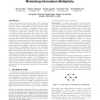Free Online Productivity Tools
i2Speak
i2Symbol
i2OCR
iTex2Img
iWeb2Print
iWeb2Shot
i2Type
iPdf2Split
iPdf2Merge
i2Bopomofo
i2Arabic
i2Style
i2Image
i2PDF
iLatex2Rtf
Sci2ools
139
click to vote
CORR
2012
Springer
2012
Springer
The Filter-Placement Problem and its Application to Minimizing Information Multiplicity
In many information networks, data items – such as updates in social networks, news flowing through interconnected RSS feeds and blogs, measurements in sensor networks, route updates in ad-hoc networks – propagate in an uncoordinated manner: nodes often relay information they receive to neighbors, independent of whether or not these neighbors received the same information from other sources. This uncoordinated data dissemination may result in significant, yet unnecessary communication and processing overheads, ultimately reducing the utility of information networks. To alleviate the negative impacts of this information multiplicity phenomenon, we propose that a subset of nodes (selected at key positions in the network) carry out additional information filtering functionality. Thus, nodes are responsible for the removal (or significant reduction) of the redundant data items relayed through them. We refer to such nodes as filters. We formally define the Filter Placement proble...
Combinatorial Optimization Problem | CORR 2012 | Education | Polynomial Time Approximation | Time Approximation Algorithms |
Related Content
| Added | 20 Apr 2012 |
| Updated | 20 Apr 2012 |
| Type | Journal |
| Year | 2012 |
| Where | CORR |
| Authors | Dóra Erdös, Vatche Ishakian, Andrei Lapets, Evimaria Terzi, Azer Bestavros |
Comments (0)

